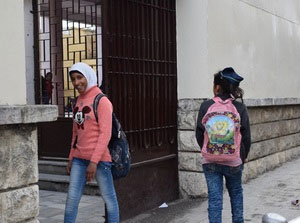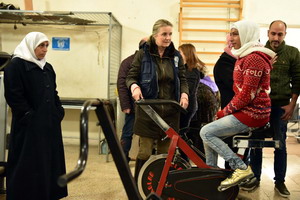 Fatima walks to school for the first time in months. With support from the Government of Japan WHO was able to provide her physical treatment needed to overcome Guillain-Barré syndrome. WHO Syria 20188 March 2018 – Twelve-year-old Fatima Hamidi lives with her 5 sisters and 7 brothers in the city of Aleppo. Over the past few years, her family’s life has been upended by uncertainty and fear. The conflict finally abated last year, and life began returning to normal. But just as Fatima was finishing the school year and getting ready for the summer holiday, her arms and legs became weak. She found it difficult to play with her friends. Eventually, she was unable to move.
Fatima walks to school for the first time in months. With support from the Government of Japan WHO was able to provide her physical treatment needed to overcome Guillain-Barré syndrome. WHO Syria 20188 March 2018 – Twelve-year-old Fatima Hamidi lives with her 5 sisters and 7 brothers in the city of Aleppo. Over the past few years, her family’s life has been upended by uncertainty and fear. The conflict finally abated last year, and life began returning to normal. But just as Fatima was finishing the school year and getting ready for the summer holiday, her arms and legs became weak. She found it difficult to play with her friends. Eventually, she was unable to move.
After weeks of tests, doctors diagnosed her condition as Guillain-Barré syndrome, a rare but serious autoimmune disorder. The high cost of medicines and treatment quickly depleted the family’s finances, and they had to be stopped. When this happened, Fatima’s health rapidly deteriorated, and with it, her sense of hope.
 Fatima at a physical therapy session. WHO Syria 2018Desperate to help her daughter, Fatima’s mother found a patient recovering from the same syndrome, who told her about Yadan Biyad, a nongovernmental organization supported by the World Health Organization (WHO) that treats patients for free. Doctors and physical therapists at Yadan Biyad prescribed medicines and a rigorous course of daily physiotherapy for Fatima. Within weeks, she recovered enough strength to go for treatment on her own. It wasn’t long before she was back in school, studying hard and looking forward to the future again.
Fatima at a physical therapy session. WHO Syria 2018Desperate to help her daughter, Fatima’s mother found a patient recovering from the same syndrome, who told her about Yadan Biyad, a nongovernmental organization supported by the World Health Organization (WHO) that treats patients for free. Doctors and physical therapists at Yadan Biyad prescribed medicines and a rigorous course of daily physiotherapy for Fatima. Within weeks, she recovered enough strength to go for treatment on her own. It wasn’t long before she was back in school, studying hard and looking forward to the future again.
Fatima is one of over 13 000 Syrian children who have received free health care thanks to a generous donation to WHO from the Government of Japan. WHO has used these funds to support health-focused nongovernmental organizations that treat people throughout Syria. With support from Japan, nongovernmental organizations such as Yadan Biyad, Al-Ber, and Al-Ihsan Charity Society have treated over 67 000 Syrians who would otherwise have been unable to obtain any kind of health care.








